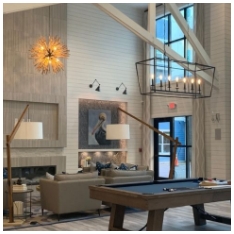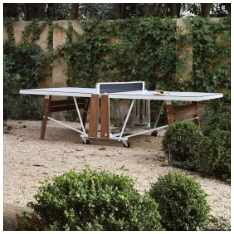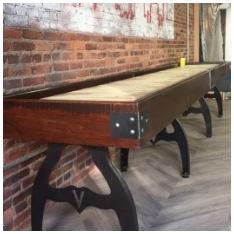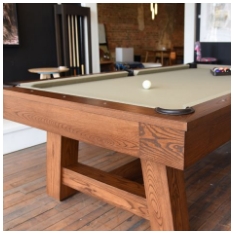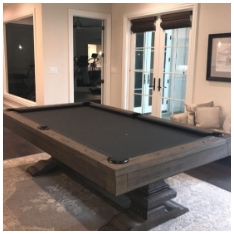Choosing the right pool table can significantly enhance your game experience, whether for personal use or in a commercial setting. However, with numerous options available, identifying a good pool table may seem daunting. This guide will help you understand the essential characteristics and factors that define quality pool tables, ensuring you make an informed decision.
What is a Pool Table?
A pool table, commonly found in homes, bars, and game rooms, is a specially designed table used for playing various cue sports. The most popular games played on these tables include eight-ball, nine-ball, and straight pool.

Types of Pool Tables
There are several types of pool tables, each designed for specific games:
- Standard Pool Tables: Generally used for eight-ball or nine-ball games, these tables vary in size and style.
- Snooker Tables: Larger than standard pool tables, snooker tables have smaller pockets and are used for playing snooker.
- Carom Tables: Designed for games without pockets, such as three-cushion billiards.
Understanding these distinctions can help you choose a table that best fits your gaming preferences.
Key Features of a Quality Pool Table
1. Construction Material
The construction material of a pool table significantly influences its quality and longevity. High-quality pool tables are typically made from solid wood, while lower-end models might use particle board or MDF. Look for the following materials:
- Slate: The best pool tables use a slate bed, which offers a smooth playing surface and excellent durability. Slate is heavy and can be found in various thicknesses (usually 3/4” or 1”).
- Wood: Solid hardwood, like oak or maple, ensures sturdiness and can withstand the rigors of gameplay.
2. Frame and Legs
A stable frame and sturdy legs are crucial for a quality pool table. The frame should be well-built, supporting the weight of the slate and preventing warping over time. Look for:
- Knee Braces: These provide extra support and stability.
- Adjustable Feet: They allow for leveling the table, which is essential for proper gameplay.
3. Playing Surface
The playing surface is perhaps the most critical aspect of any pool table. A high-quality surface will enhance gameplay and improve shot accuracy. Key factors include:
- Felt Quality: Premium wool or a wool blend offers better speed and durability. Avoid tables with low-quality synthetic felt.
- Smoothness: The surface should be perfectly flat and smooth, free of bumps or imperfections.
4. Pockets
Pockets can significantly affect gameplay. There are two main types:
- Drop Pockets: These pockets allow balls to drop into a hidden compartment, which can be more aesthetically pleasing.
- Shield Pockets: Visible pockets that can be easily accessed for ball retrieval.
Ensure that the pockets are appropriately sized for the balls you’ll be using. Oversized pockets may make the game too easy, while undersized pockets can be frustrating.
5. Size
Pool tables come in various sizes, and the right size will depend on the available space and intended use. Common sizes include:
- 7-foot: Suitable for home use and smaller spaces.
- 8-foot: A popular choice for homes and commercial settings.
- 9-foot: Typically found in professional environments and offers a more challenging gameplay experience.
6. Price Range
Quality pool tables come at varying price points. While it can be tempting to opt for the cheapest option, investing in a well-built table will pay off in the long run. Expect to pay anywhere from $1,000 to $5,000 for a good quality pool table, depending on the materials and features.
How to Evaluate a Pool Table
1. Inspect the Construction
Before purchasing, physically inspect the pool table. Check for solid construction, ensuring there are no loose parts. Pay attention to the joints and seams—quality tables will have precise craftsmanship.
2. Test the Playing Surface
If possible, try playing a few shots on the table to assess the playing surface. It should feel smooth and provide consistent ball movement. If the table has been recently set up, ensure that the felt is correctly stretched and not wrinkled.
3. Assess Stability
Push down on the table to check for wobbling. A good pool table should remain stable and sturdy, even when pressure is applied. If it shakes or moves, it may not be a reliable choice.
4. Look for Brand Reputation
Research reputable brands known for their quality pool tables. Brands with a long history in the industry often provide better warranties and customer service. Look for user reviews and expert recommendations to guide your decision.
Conclusion
Identifying a good pool table involves understanding the key features that define quality. By considering construction materials, frame stability, playing surface quality, pocket design, size, and price, you can make an informed decision that enhances your gaming experience. Remember, a well-chosen pool table not only provides years of enjoyment but also adds a touch of elegance to your space.

